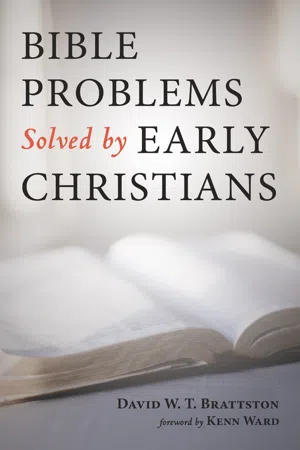
- 146 pages
- English
- ePUB (mobile friendly)
- Available on iOS & Android
Bible Problems Solved by Early Christians
About this book
This book deals with questions or problems encountered in the Bible where answers can be found in the ante-Nicene fathers. The fathers were uniquely qualified by being close in time and culture to Christ himself, when his unwritten teachings and Scripture interpretations, and those of the apostles, were still fresh in Christian memory. It is designed for sincere readers of the Bible who may from time to time be puzzled by the occasional passage which seems out-of-step with the rest of the Scriptures or our usual impression of Christian teaching.This work is written for individual and group Bible students without advanced theological qualifications, rather than the intellectual market. It is written for use in Bible studies in local congregations, or church history classes, especially in sessions when the pastor or teacher is unable to attend.Bible Problems Solved by Early Christians is different from almost all other works and ministries, which give solutions to problems or questions, because the answers in the book come not from a modern-day comparison of different verses within the Bible itself or from the interpretations of any particular religious denomination, but from Christian writers who lived in the first centuries after Jesus.
Information
Adam’s Sin and the Severity of its Consequences
Keeping Busy in Heaven
“Tell No One”
Table of contents
- Title Page
- Foreword
- Preface
- Chapter 1: Adam’s Sin and the Severity of its Consequences
- Chapter 2: Keeping Busy in Heaven
- Chapter 3: “Tell No One”
- Chapter 4: The Israelites Plundering the Egyptians
- Chapter 5: Baptism for the Dead
- Chapter 6: Limiting the Almighty
- Chapter 7: Punishing Children for their Fathers’ Sins
- Chapter 8: Praying without Ceasing
- Chapter 9: Jesus Sweating Blood
- Chapter 10: Mutilate Yourself
- Chapter 11: Hitting the Right Cheek
- Chapter 12: Give to Everyone who Asks
- Chapter 13: Common Property or Common Fund?
- Chapter 14: Is it a Sin to be Wealthy?
- Chapter 15: The Command to Hate
- Chapter 16: Jesus’ Violence in the Temple
- Chapter 17: Exterminating Your Enemies
- Chapter 18: Smashing Children against Rocks
- Chapter 19: Abortion
- Chapter 20: Euthanasia
- Chapter 21: Seeing the Invisible
- Chapter 22: God’s Body
- Chapter 23: Anger without Sin
- Chapter 24: The Anger of God
- Chapter 25: Does God Repent?
- Chapter 26: The Jealousy of God
- Chapter 27: Divine Dishonesty
- Chapter 28: The Deceitful Deity
- Chapter 29: Limited Forgiveness
- Chapter 30: Blasphemy against the Holy Spirit
- Chapter 31: Marriage vs Virginity
- Chapter 32: Polygamy
- Chapter 33: When Was the Apostasy?
- Chapter 34: Judging other People
- Chapter 35: Did Gifts of the Spirit Continue?
- Chapter 36: Slavery
- Bibliography
Frequently asked questions
- Essential is ideal for learners and professionals who enjoy exploring a wide range of subjects. Access the Essential Library with 800,000+ trusted titles and best-sellers across business, personal growth, and the humanities. Includes unlimited reading time and Standard Read Aloud voice.
- Complete: Perfect for advanced learners and researchers needing full, unrestricted access. Unlock 1.4M+ books across hundreds of subjects, including academic and specialized titles. The Complete Plan also includes advanced features like Premium Read Aloud and Research Assistant.
Please note we cannot support devices running on iOS 13 and Android 7 or earlier. Learn more about using the app